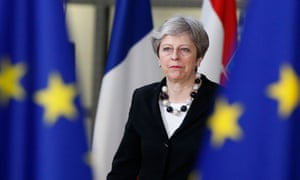
Each of the government’s four Brexit scenarios, including a bespoke deal, would leave Britain poorer and cost the taxpayer hundreds of millions of pounds each week, analysis has shown.
The study for the thinktank Global Future by Jonathan Portes, a professor of economics and public policy at King’s College, London, found that a bespoke deal, the government’s preferred option, would have a net negative fiscal impact of about £40bn a year.
Polling commissioned for study by Populus, which is run by David Cameron’s former strategy chief Andrew Cooper, found that voters, even those who backed Brexit, feared that leaving the European Union would come at “too high a price”.
The analysis came as the government braced itself for defeats in parliament on Wednesday, including over its plans to take the UK out of the customs union, as the EU withdrawal bill returns to the House of Lords.
Nine senior Conservatives, including two former cabinet ministers, are among those who have put their names to a series of cross-party amendments aimed at persuading Theresa May to rethink her position.
The amendment giving parliament a vote on staying in a customs union, which is almost certain to pass, would mean MPs will get a say on the contentious issue despite the government’s efforts to kick it into the long grass. The only way the prime minister will be able to avoid defeat will be to offer significant concessions.
The Global Future research is based on the government’s own impact studies on three different Brexit scenarios, but also examines a fourth option – a bespoke deal – using data from the official assessments along with details set out by the prime minister in her Mansion House speech.
It suggested that option would increase the cost of non-tariff barriers by £23bn over the status quo. Other costs – including customs barriers, divorce payments and ongoing contributions – would add another £38bn while limits on…










